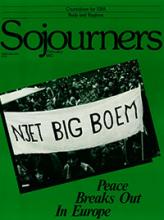Laurens Hogebrink, a member of the board of the Dutch Interchurch Peace Council (IKV), has become a prominent figure in the European movement against nuclear weapons. He is chairman of the editorial board of Disarmament Campaigns, an English-language publication based in the Hague. As a member of staff of the Department on Church and Society of the Netherlands Reformed Church, he had a major role in drafting the 1980 Pastoral Letter which condemned the possession of nuclear weapons and supported the campaign for their unilateral removal from Holland. Shortly before the massive Dutch disarmament rally in November, and just after his return from travels in Malta and Italy, he was interviewed by Jim Forest on the train between Antwerp and Amsterdam.—Jim Forest
Jim Forest: What is the driving force in the European peace movement?
Laurens Hogebrink: Moral outrage. It is not so much a matter of anti-Americanism, or at least not in the northern countries. What is driving us is the feeling of being dominated and of not being able to conceive our own policies. It is a matter of being subordinated to others and also seeing that they are going in the wrong direction.
It is political wisdom as well. Possessing more weapons is simply bad politics. A lot of people know very well deep in their hearts that politicians are not telling the truth when they say that there is nothing to worry about.
Read the Full Article

